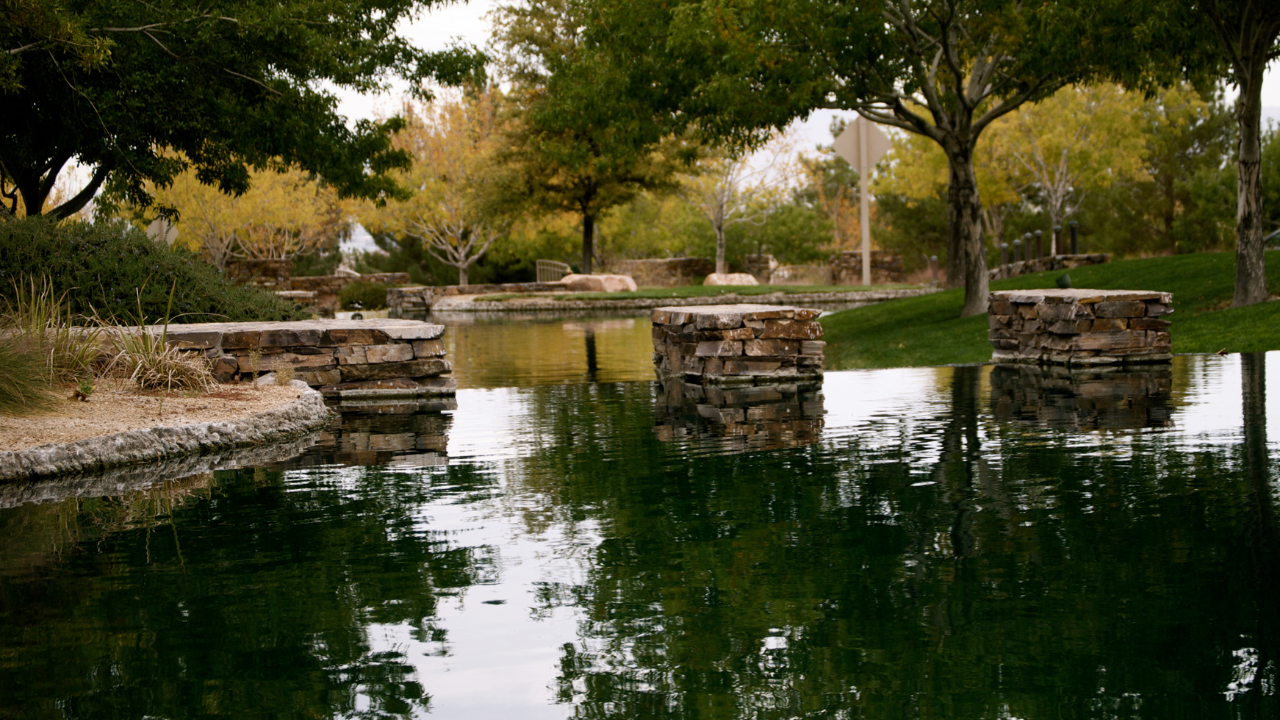3 Common Lake and Pond Management Misconceptions

By Trent Nelson
As An Aquatic specialist with more than a decade of experience, I’ve assisted hundreds of property managers with their lake and stormwater pond management needs over the years. Despite the diverse types of lakes and ponds they oversee, I’ve noticed that many clients have the same set of concerns or misconceptions about their waterbodies. These often come to light as we work together to design a freshwater management program. Let’s take an in-depth look at some of these common assumptions.
1. LAKES AND PONDS ARE PERMANENT FIXTURES IN THE LANDSCAPE
While lakes and ponds can be long-lasting features in our communities, they are not permanent. They fill with sediment that erodes from the shoreline or flows in during rainstorms. Weed growth and decomposition may lead to the development of muck. And trash, tree branches, and other pollutants can build up over time.
The aging of a lake or pond is a natural phenomenon, but can be highly accelerated through human activity and industry, reducing a waterbody’s life by decades. If left unmanaged over the years, your waterbody could eventually fill up until it becomes a marsh or puddle. This is a process called lake and pond succession.
The best way to prevent this inevitable decline is through proactive, ongoing management aimed at reducing erosion, nutrient pollution, muck development, and nuisance aquatic vegetation. These benefits are two-fold. In addition to prolonging the depth and overall lifespan of your lake or pond, you’ll also help prevent problems like algae, toxic cyanobacteria growth, bad odors, murkiness, invasive species infestations, fish kills, and more.
2. HERBICIDES POSE A DANGER TO NON-TARGETED PLANTS AND ANIMALS
The most eco-friendly and long-lasting lake and pond management programs lean on holistic, natural solutions, but sometimes herbicides and algaecides are necessary to set your waterbody up for success. Herbicides tend to be a point of concern for property owners, but I’ve found that once they better understand the strict scientific processes surrounding the use of herbicides, their fears are alleviated.
Herbicides used in the lake management industry are designed to exclusively target specific weed and algae species without impacting desirable plants and animals. They do so by interfering with the unique growth mechanisms identified in nuisance species that are not found in beneficial ones. Likewise, the concurrent use of eco-friendly compounds called surfactants helps confine herbicides and algaecides to the affected area without migrating elsewhere. Historically, herbicides have been applied by licensed professional ground crews, but new industry technologies like drones are making it possible to remotely apply products with more accuracy and efficiency, particularly in areas that are hard to reach or unsafe to navigate by foot.
All herbicides must be evaluated and registered by the Environmental Protection Agency (EPA). In addition to collaborating with scientific authorities throughout the US, the EPA also carries out bilateral cooperative programs with the World Health Organization (WHO) and many other countries around the world. Once approved, all herbicides are subject to compliance monitoring and periodic reevaluation processes to ensure lasting safety and success.
3. ALL FRESHWATER MANAGEMENT PROGRAMS ARE THE SAME
It’s not uncommon for a property manager to assume that the solutions used on a friend or colleague’s lake or pond will work on theirs. Unfortunately, there’s no one-size-fits-all approach to lake and pond problems because no two aquatic ecosystems are the same.
Your waterbody’s unique makeup and the way it responds to different treatments can be dictated by many factors, including water use, location, surroundings, plant and animal presence, pollution, and weather - just to name a few. Likewise, every stakeholder has different goals and budget requirements. That’s why freshwater management programs are most effective when customized for your unique aquatic environment.
Typically, the program design process begins by establishing a baseline of your waterbody through a visual survey of the property and comprehensive water quality testing. Your aquatic specialist should work with you to identify the challenges your aquatic ecosystem is facing and determine the best course of action based on your needs and limitations. And because all of these factors can change over time, these conversations should continue on a regular basis.
The management of lakes and ponds is truly a science and should be treated as such. When considering a management program, look for a freshwater management firm that prioritizes getting to know you and your aquatic ecosystem before implementing any services. Seek out an aquatic specialist who is educated about the responsible use of herbicides and is capable of sharing that knowledge with you in a clear manner. Our lakes and ponds are valued features that our communities rely on every day. If you oversee the management of these water resources, make sure you’re investing in both the present and its future.
Trent Nelson is an aquatic specialist at SOLitude Lake Management, the nation’s leading freshwater management firm specializing in the management of lakes, stormwater ponds, wetlands, and fisheries. Learn more about this topic at www.solitudelakemanagement.com/knowledge.
